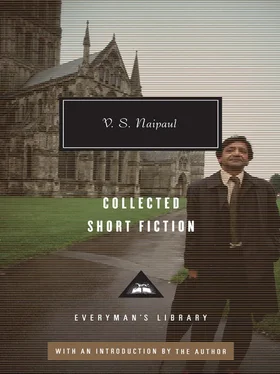He did everything as though he were doing it for the first time in his life. He did everything as though he were doing some church rite.
He would say to me, ‘Now, how about having some ice-cream?’
And when I said yes, he would grow very serious and say, ‘Now, which café shall we patronize?’ As though it were a very important thing. He would think for some time about it and finally say, ‘I think I will go and negotiate the purchase with that shop.’
The world became a most exciting place.
One day, when I was in his yard, he said to me, ‘I have a great secret which I am now going to tell you.’
I said, ‘It really secret?’
‘At the moment, yes.’
I looked at him, and he looked at me. He said, ‘This is just between you and me, remember. I am writing a poem.’
‘Oh.’ I was disappointed.
He said, ‘But this is a different sort of poem. This is the greatest poem in the world.’
I whistled.
He said, ‘I have been working on it for more than five years now. I will finish it in about twenty-two years from now, that is, if I keep on writing at the present rate.’
‘You does write a lot, then?’
He said, ‘Not any more. I just write one line a month. But I make sure it is a good line.’
I asked, ‘What was last month’s good line?’
He looked up at the sky and said, ‘The past is deep.’
I said, ‘It is a beautiful line.’
B. Wordsworth said, ‘I hope to distil the experiences of a whole month into that single line of poetry. So, in twenty-two years, I shall have written a poem that will sing to all humanity.’
I was filled with wonder.
Our walks continued. We walked along the sea-wall at Docksite one day, and I said, ‘Mr Wordsworth, if I drop this pin in the water, you think it will float?’
He said, ‘This is a strange world. Drop your pin, and let us see what will happen.’
The pin sank.
I said, ‘How is the poem this month?’
But he never told me any other line. He merely said, ‘Oh, it comes, you know. It comes.’
Or we would sit on the sea-wall and watch the liners come into the harbour.
But of the greatest poem in the world I heard no more.
* * *
I felt he was growing older.
‘How you does live, Mr Wordsworth?’ I asked him one day.
He said, ‘You mean how I get money?’
When I nodded, he laughed in a crooked way.
He said, ‘I sing calypsoes in the calypso season.’
‘And that last you the rest of the year?’
‘It is enough.’
‘But you will be the richest man in the world when you write the greatest poem?’
He didn’t reply.
One day when I went to see him in his little house I found him lying on his little bed. He looked so old and so weak that I found myself wanting to cry.
He said, ‘The poem is not going well.’
He wasn’t looking at me. He was looking through the window at the coconut tree, and he was speaking as though I wasn’t there. He said, ‘When I was twenty I felt the power within myself.’ Then, almost in front of my eyes, I could see his face growing older and more tired. He said, ‘But that — that was a long time ago.’
And then — I felt it so keenly, it was as though I had been slapped by my mother. I could see it clearly on his face. It was there for everyone to see. Death on the shrinking face.
He looked at me, and saw my tears and sat up.
He said, ‘Come.’ I went and sat on his knees.
He looked into my eyes, and he said, ‘Oh, you can see it, too. I always knew you had the poet’s eye.’
He didn’t even look sad, and that made me burst out crying loudly.
He pulled me to his thin chest and said, ‘Do you want me to tell you a funny story?’ and he smiled encouragingly at me.
But I couldn’t reply.
He said, ‘When I have finished this story, I want you to promise that you will go away and never come back to see me. Do you promise?’
I nodded.
He said, ‘Good. Well, listen. That story I told you about the boy poet and the girl poet, do you remember that? That wasn’t true. It was something I just made up. All this talk about poetry and the greatest poem in the world, that wasn’t true, either. Isn’t that the funniest thing you have heard?’
But his voice broke.
I left the house and ran home crying, like a poet, for everything I saw.
I walked along Alberto Street a year later, but I could find no sign of the poet’s house. It hadn’t vanished, just like that. It had been pulled down, and a big, two-storeyed building had taken its place. The mango tree and the plum tree and the coconut tree had all been cut down, and there was brick and concrete everywhere.
It was just as though B. Wordsworth had never existed.
BIG FOOT WAS really big and really black, and everybody in Miguel Street was afraid of him. It wasn’t his bigness or his blackness that people feared, for there were blacker and bigger people about. People were afraid of him because he was so silent and sulky; he looked dangerous, like those terrible dogs that never bark but just look at you from the corner of their eyes.
Hat used to say, ‘Is only a form of showing off, you know, all this quietness he does give us. He quiet just because he ain’t have anything to say, that’s all.’
Yet you could hear Hat telling all sorts of people at the races and cricket, ‘Big Foot and me? We is bosom pals, man. We grow up together.’
And at school I myself used to say, ‘Big Foot does live in my street, you hear. I know him good good, and if any one of all you touch me, I go tell Big Foot.’
At that time I had never spoken a single word to Big Foot.
We in Miguel Street were proud to claim him because he was something of a character in Port of Spain, and had quite a reputation. It was Big Foot who flung the stone at the Radio Trinidad building one day and broke a window. When the magistrate asked why he did it, Big Foot just said, ‘To wake them up.’
A well-wisher paid the fine for him.
Then there was the time he got a job driving one of the diesel-buses. He drove the bus out of the city to Carenage, five miles away, and told the passengers to get out and bathe. He stood by to see that they did.
After that he got a job as a postman, and he had a great time misplacing people’s letters. They found him at Docksite, with the bag half full of letters, soaking his big feet in the Gulf of Paria.
He said, ‘Is hard work, walking all over the place, delivering people letters. You come like a postage stamp, man.’
All Trinidad thought of him as a comedian, but we who knew him thought otherwise.
It was people like Big Foot who gave the steel-bands a bad name. Big Foot was always ready to start a fight with another band, but he looked so big and dangerous that he himself was never involved in any fight, and he never went to jail for more than three months or so at a time.
Hat, especially, was afraid of Big Foot. Hat often said, ‘I don’t know why they don’t lose Big Foot in jail, you know.’
You would have thought that when he was beating his pans and dancing in the street at Carnival, Big Foot would at least smile and look happy. But no. It was on occasions like this that he prepared his sulkiest and grimmest face; and when you saw him beating a pan, you felt, to judge by his earnestness, that he was doing some sacred act.
One day a big crowd of us — Hat, Edward, Eddoes, Boyee, Errol and myself — went to the cinema. We were sitting in a row, laughing and talking all during the film, having a good time.
A voice from behind said, very quietly, ‘Shut up.’
We turned and saw Big Foot.
He lazily pulled out a knife from his trouser pocket, flicked the blade open, and stuck it in the back of my chair.
Читать дальше









